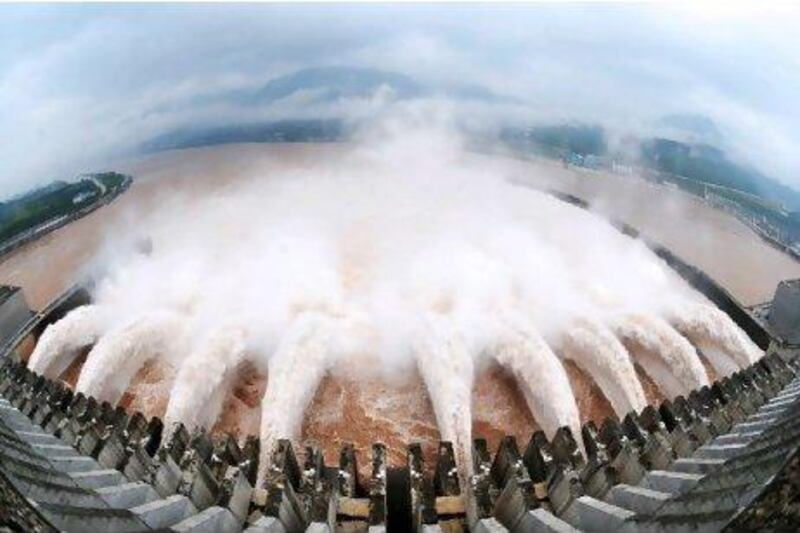BEIJING // When mass relocations of residents for China's south-to-north water diversion project took place in August last year, even the state media reported on the sadness many felt at being forced to leave their home towns.
Among the one third of a million people moved were many elderly residents who were forced to leave villages they had spent their whole lives in.
It was described as the biggest relocation the country had seen since the early days of the Three Gorges Dam project, when dozens of cities and towns were submerged by the creation of a huge lake.
Yet a country largely run by engineers - the president, Hu Jintao is a water specialist - and where the freshwater resources per person - at 2220 cubic metres - are a quarter of the global average, is perhaps more likely than most to resort to drastic measures to maintain stable water supplies.
In May there was the significant admission from the authorities that the Three Gorges Dam project, a Yangtze River hydroelectric dam, construction of which began in 1994, had run into major problems. A government statement admitted living conditions for the 1.3 million people relocated had to be improved and warned of the risk of "geological disasters". Although these had long been identified by observers, this was the first official acknowledgement of the scale of the difficulties. The cost of alleviating the problems created by the dam has been estimated at 100 billion yuan (Dh56.8 bn) - or half as much as the bill for the project itself. The admission of problems has been interpreted as a warning to those pressing for further major hydropower schemes in future.
"Some people see a veiled message to the hydropower lobby: if you want to build more hydropower in future, you have to do better than was done with the Three Gorges Dam," said Lars Andersson, a deputy team leader at the EU-China River Basin Management Programme. "It's to say: don't hurry as much as you did, don't make the short cuts you did."
Indeed in a planning document released by the government at the start of this year, the importance of hydropower as a contributor to the country's overall energy requirement was "toned down", according to Mr Andersson.
Yet he said the Three Gorges Dam had recently shown itself able to control flooding on the Yangtze River, a welcome development as "flooding has been at a huge cost of life in the Yangtze".
The sensitivity of the Chinese authorities to criticism over the vast water-related engineering projects is shown by the fact that internet searches about relocations or environmental problems linked to the schemes are often blocked within China. It still suffers from the problem of there being vast numbers of people living in the heavily industrialised northern areas of the country, where there is relatively little rainfall. The almost two-thirds of the country that lies north of the Yangtze have less than a fifth of the country's water resources.
Mohamed Ghidaoui, a professor of hydraulics and water resources at the department of civil and environmental engineering at Hong Kong University of Science and Technology, said he was "optimistic and hopeful" things would improve once the transfer of water through the south-to-north water diversion project, a scheme to take water from the Yangtze River to the Yellow and Hai Rivers further north, begins.
"It will help, instead of taking away the groundwater," he said. "The one thing you always worry about is the increase in population, but China seems to have that under good control."
He added it was "almost a certainty" that, because so many of China's senior officials were engineers, the country was more ready to consider such large-scale engineering projects.
The country should continue on this path and learn from its mistakes rather than curtail its ambitions because of problems with schemes such as the Three Gorges Dam, he said.
"Things tend to be slow in North America, because engineers are technocrats and less involved in the decision-making process," he said.
"I'm glad it's the other way round in China. Many of the key people are engineers so at least there's a balanced view."






